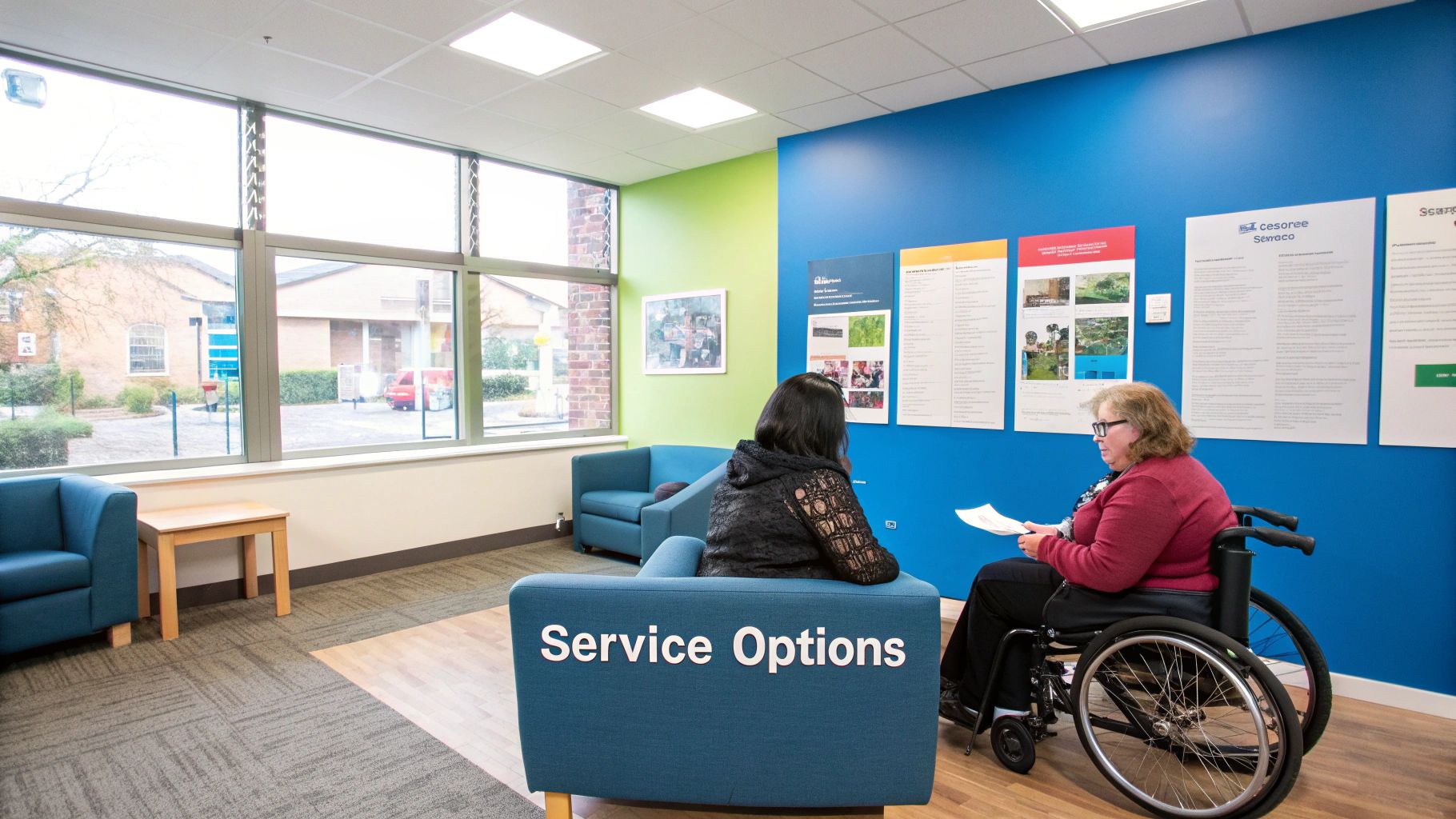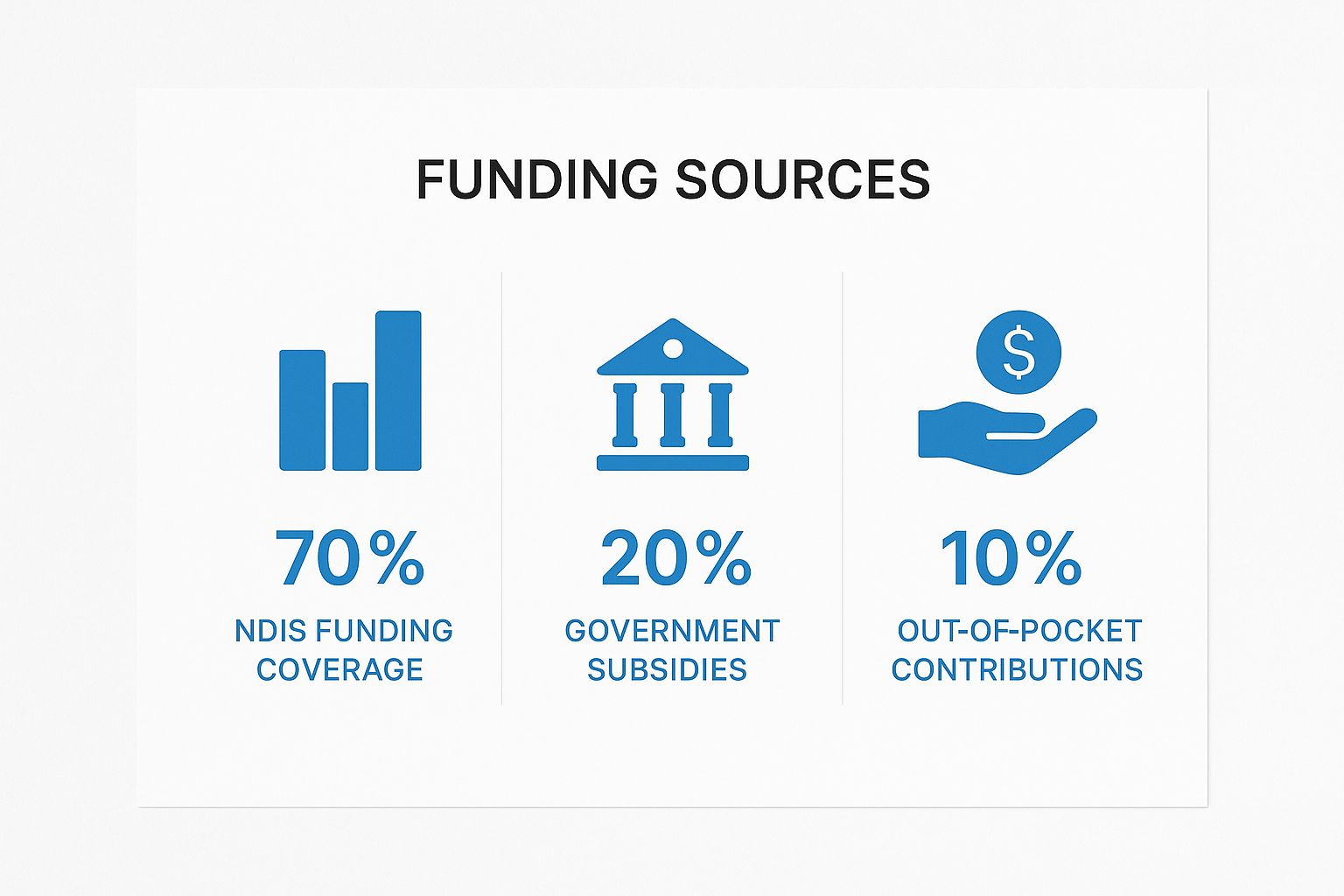Finding Disability Services Adelaide You Can Trust

Finding the right disability services in Adelaide can feel like a huge task, but it doesn't have to be overwhelming. When you know what you're looking for and what questions to ask, the whole process becomes much clearer. It’s all about finding a team that truly gets you and your goals.
Finding the Right Support in Adelaide
With so many providers out there, how do you find the one that’s a perfect fit? Think of it less like a search and more like building a partnership. You want someone who listens, adapts, and genuinely cares about helping you live the life you want.
The need for great support in our community is growing fast. As of 31 March 2024, there were 60,859 NDIS participants in South Australia. That’s an increase of 1,835 people in just three months, which really shows how vital reliable, high-quality disability services are right here in Adelaide. You can dig into these numbers yourself in the latest NDIS quarterly report.
This growth means you have more choices, but it also means you need to be savvy about picking the right provider.
Key Factors for Your Decision
When you're meeting with potential providers, it really comes down to a few critical things. Before you make any decisions, think about how they stack up in these areas:
- A Personalised Approach: Do they actually listen? A great provider will want to know about your interests, your goals, and how you like to communicate. The support should be designed with you, not just delivered to you.
- Staff Consistency: Ask if you'll have a consistent support worker or a small, dedicated team. It's tough to build trust and rapport when you're seeing a new face every week.
- Local Community Knowledge: Does the provider know Adelaide inside and out? A team with deep local roots can help you connect with community groups, find accessible local spots, and feel truly part of your neighbourhood.
- Clear and Open Communication: How easy are they to get in touch with? You should feel completely comfortable calling them to ask questions, raise a concern, or suggest a change to your supports.
Your voice should always be the most important one in the conversation. The right provider won't just hear you; they'll actively listen and make sure your support is genuinely directed by you.
At Vana Care, we've built our entire approach around these principles. We see support as people helping people—it's about connection, not just a service. Our goal is to match you with support workers who not only have the right skills but also share your interests and bring great energy to the table, whether it’s for help around the house or getting out and about in the community.
To help you organise your thoughts, here’s a quick table you can use when you're comparing different providers.
Key Decision Factors When Choosing a Provider
| Criteria | Why It Matters | Example Question to Ask |
|---|---|---|
| Personalised Care Planning | Generic plans don't work. Your support should reflect your unique life and aspirations. | "Can you walk me through how you would create a support plan based on my specific goals?" |
| Staff Matching & Consistency | Building a trusting relationship is key to feeling comfortable and supported. | "What is your process for matching support workers with participants, and what happens if it's not a good fit?" |
| Community Connection | A good provider helps you engage with your local area, not just stay at home. | "How do you help participants get involved in local Adelaide community events or groups?" |
| Flexibility & Responsiveness | Your needs can change. Your provider should be able to adapt with you. | "If my support needs change unexpectedly, how quickly can you adjust my services?" |
| Communication & Feedback | You need to know you can speak up and be heard, no matter what. | "What's the best way to give feedback or raise a concern, and who would I speak to?" |
Taking the time to ask these questions upfront will save you a lot of hassle later and ensure you find a team you can truly rely on.
This focus on proactive, individualised support is where disability care is heading. If you're interested in learning more, you can read about the future of disability care and the innovations shaping services in South Australia. At the end of the day, you deserve a provider who helps you live with freedom, choice, and dignity.
Turning Your NDIS Plan Into Real-World Support

An NDIS plan is much more than just a piece of paper—it's the key that unlocks the support you need to live the life you want. Before diving into the search for disability services in Adelaide, the first, most critical step is to really get to grips with what your plan says and what it empowers you to do.
Think of it less like a formal document and more like a personal roadmap. It’s all about translating the official NDIS language into a practical plan of action that makes sense for you. This starts with understanding the different support budgets outlined in your plan.
Getting to Know Your NDIS Support Budgets
When you look at your plan, you'll see it's broken down into different funding categories. Each one has a specific job. Knowing what's what is essential for matching your funding to your actual, day-to-day needs and long-term goals.
There are three main types of support budgets you’ll come across:
- Core Supports: This is your most flexible bucket of funding. It’s designed to help with daily activities, getting involved in the community, transport, and everyday assistive items. You might use this budget for a support worker to help with tasks around the house or to go with you to cheer on the Crows at Adelaide Oval.
- Capacity Building Supports: This funding is all about growth—helping you build your skills and independence for the future. You could use it for therapy to improve communication, learn to cook new meals, or get support with finding a job. The whole idea is to build your ability to do more on your own over time.
- Capital Supports: This budget is set aside for bigger ticket items. We’re talking about higher-cost assistive technology, specialised equipment, or modifications to your home or vehicle, like installing a ramp or getting a custom bed.
The true value of an NDIS plan isn’t just the funding itself, but how you choose to direct it. Your vision for your life is the most important ingredient in deciding how these budgets get used.
To put it into perspective, two people in Adelaide with almost identical Core Support funding could build completely different support networks. One person might use their funds to join a local art class, with a support worker helping with transport and participation. Another might use that same funding for in-home help with meal prep and personal care, building a solid foundation for living more independently.
Making a Checklist That's All About You
Once you're clear on your budgets, it's time to create a personal needs checklist. This isn't about ticking boxes for a provider; it's about being honest about what you want and need. Forget the NDIS jargon for a moment and just focus on your life and your ambitions.
Start by asking yourself a few straightforward questions:
- What does a truly great day look like for me? (Maybe it’s getting out to the Adelaide Central Market, spending time on a favourite hobby, or just feeling on top of things at home.)
- What are my biggest hurdles right now? (It could be anything from managing household chores and feeling a bit isolated to needing a hand with transport.)
- What’s one skill I'd absolutely love to learn this year? (Perhaps it’s catching public transport confidently, learning to budget your money, or mastering three new recipes.)
- How do I want to be part of my community? (This could mean joining a local sports team, finding a volunteer role, or just being able to attend local festivals.)
This checklist becomes your personal blueprint. When you start talking to providers of disability services in Adelaide, you can share this vision. It helps them see you as a person, not just a plan number.
This whole process can feel a bit overwhelming, which is why having a professional in your corner can make all the difference. To see how that works, check out our guide on maximising your NDIS plan with support coordination. Having this clear, personal direction is the foundation for finding a provider who will become a true partner on your journey.
How to Research and Shortlist Adelaide Providers

Alright, you've figured out what you need. Now comes the exciting part: finding the people who can actually help you achieve it. Searching for the right disability services in Adelaide goes way beyond a quick Google search. It’s about being strategic and finding a provider that not only delivers on its promises but truly gets you.
The NDIS Provider Finder portal is the logical first stop. It’s a reliable tool for creating a starting list of registered providers in your area. You can filter by the specific supports you need, which helps to cut through the noise and give you a solid foundation.
It helps to remember you’re not alone in this search. Recent national data from 2022 shows that 21.4% of Australians live with some form of disability. These aren't just statistics; they represent a growing demand for genuinely good, person-first support right here in Adelaide.
What to Look For on a Provider's Website
A provider's website is their digital storefront, and it can reveal a lot about their culture and priorities. Your job is to look past the slick marketing and find real substance.
- Their Core Values: Do their values actually mean something to you? Keep an eye out for words like "respect," "collaboration," and "empowerment." At Vana Care, we believe great care feels like people helping people—a simple idea that guides everything we do.
- Meet the Team: Do they introduce you to their staff? A provider who is proud of its team will usually feature photos and stories about their people, their qualifications, and why they're passionate about this work.
- Real Client Stories: Testimonials and case studies are pure gold. They offer a window into how the provider actually supports people and what kind of outcomes they help create.
A website should make you feel seen and understood. If it feels cold, clinical, or bogged down in jargon, that's a red flag. It might suggest their approach is more about ticking boxes than connecting with people. Trust your gut.
Gathering Recommendations and Reading Reviews
Nothing beats a real recommendation from someone you trust. If you have a Support Coordinator, lean on them. They have firsthand experience with a wide range of Adelaide providers and can offer insights you won’t find anywhere else.
Online reviews on platforms like Google or Clickability are also incredibly useful for getting honest feedback. Don't just skim them—look for recurring themes. Are clients consistently happy with communication? The quality of the support workers? Their flexibility?
When you're creating your shortlist, it can also be useful to see how providers approach specific needs. For instance, looking at how to find neurodiversity-affirming therapists can give you clues about which organisations prioritise a respectful, modern approach to care.
As you narrow down your list, focus on providers with a real local presence and a history of putting clients first. For a more detailed breakdown, our guide on choosing the right disability support in Adelaide is a great resource. The goal here isn't just to find a provider, but to find a few you're genuinely excited to connect with.
Digging Deeper with a Provider Interview
Once you have a shortlist of potential providers, the real work begins. This is where you move past the polished websites and brochures and have a genuine conversation. Think of it less like a formal interview and more like a chat to see if you click. It's your opportunity to get a feel for their personality and see if their values truly line up with what’s important to you.
The key is to go in prepared. Having a set of thoughtful questions gives you control of the conversation, ensuring you get the answers you really need to make a confident decision. This isn't just about them assessing your needs; it's about you assessing their ability to meet them. Do they listen? Do you feel respected from the get-go?
The Right Questions to Ask
Forget the standard, generic questions. You want to ask things that get to the heart of how a provider actually operates. The best questions often prompt them to share a real-world story or a specific example, which is far more revealing than a simple yes or no.
Here are a few ideas to get you started:
- "Could you share a story about a time you supported a participant to reach a personal goal they were passionate about?"
- "What's your process for matching support workers with participants? How do you make sure we have a consistent team to build a real connection with?"
- "If we had some feedback or a complaint, what would that process look like? Can you walk me through the steps you take?"
Listen closely to their answers. You're looking for proof that they put people first, not just a list of services.
A key takeaway: A truly great provider of disability services in Adelaide will always speak directly to the person receiving support, not just their family or support coordinator. They should listen more than they talk, making it clear that you are in control.
Creating a Comparison Checklist
To keep things organised, especially if you're speaking with multiple providers, a simple checklist can be a lifesaver. It helps you compare apples with apples and make a decision based on what matters most to you.
Here's a template you can use:
Provider Interview Checklist
| Question Category | Provider A Response | Provider B Response | Provider C Response |
|---|---|---|---|
| Matching Process | |||
| Staff Training | |||
| Communication Style | |||
| Goal Achievement Example | |||
| Complaint Handling | |||
| Flexibility/Adaptability |
Jotting down notes in a table like this during or right after your conversations will make the final decision much clearer.
Understanding the NDIS and Costs
It's also completely normal—and necessary—to talk about the financial side of things. You need to understand how your NDIS plan will work with their service agreements.

For most eligible participants, the NDIS covers the vast majority of costs, which is designed to ensure you can access the quality support you need without financial stress.
Ultimately, the goal is to find a team you feel a genuine connection with. Here at Vana Care, we genuinely look forward to these conversations. They’re the first step in building a strong, trusting partnership. We believe the best support starts with listening, and our entire approach is built around your goals and your choices.
A good interview should leave you feeling heard, hopeful, and confident about the path ahead.
Making the Final Choice and Starting Your Service

So, you’ve done the research, had the conversations, and now it’s time to decide. This can feel like a huge decision, but it doesn't have to be overwhelming. You've probably already got a good feeling about one provider.
Now’s the time to trust that feeling. Lay out your notes, compare them to your must-haves, and ask yourself a simple question: who made you feel the most understood? Which team genuinely listened and got excited about your goals? That personal connection is often the most important sign of a great long-term partnership. Once you’ve made your choice, it’s time to get the ball rolling.
Understanding Your Service Agreement
A good provider won’t just hand you a stack of papers to sign. They’ll walk you through everything, starting with the service agreement. This document is more than just a formality—it’s the foundation of your support relationship. It spells out exactly what you can expect, leaving no room for confusion down the line.
Before you put pen to paper, take the time to go through it with a fine-tooth comb. It should clearly detail:
- The exact supports you’ll receive (e.g., personal care at home, transport to community activities).
- The schedule of those supports, including specific days and times.
- A clear breakdown of all costs and how your NDIS funds will be charged.
- Policies for things like cancellations or changing a shift.
- Who to contact if you have feedback or need to resolve an issue.
A service agreement should feel like a written confirmation of all the positive conversations you’ve already had. It's there to protect you and make sure there are no surprises, putting you in the driver’s seat from the very beginning.
This agreement is also the perfect opportunity to ask about your support team. For instance, knowing whether your support workers are permanent or casual employees can help you understand what to expect regarding consistency. Nationally, the workforce is a mix, with about 60% permanent staff and 40% casuals offering flexibility. This is true for disability services in Adelaide too. Knowing this helps you have a clear conversation with your provider about scheduling and building a consistent team. For more data, you can look into the 2025 Report on Government Services.
Starting Your Services on the Right Foot
The first few weeks with a new provider are crucial. They set the tone for everything that follows. At Vana Care, we focus on making this transition as smooth as possible, built on open and honest communication. The goal is simple: you should feel supported, respected, and in control right from day one.
Your first support sessions should feel like a comfortable continuation of your initial planning meetings, not like starting from scratch. Having the right team in place makes all the difference here. A great start builds trust and creates positive momentum, paving the way for a successful and empowering partnership.
You can get a better sense of how a dedicated provider handles this transition by reading about our expert support strategies for in-home care.
Answering Your Questions About Adelaide Disability Services
Diving into the world of disability support can feel overwhelming, and it’s natural to have questions about how it all works.Let’s tackle some of the most common queries we hear from people looking for the right services in Adelaide.
What Happens If I'm Not Happy With My Provider?
Feeling comfortable and supported is non-negotiable. If your current provider isn't the right fit, you absolutely have the right to switch.
First, take a look at your service agreement. This document outlines the notice period you need to give, which is usually between 14 to 28 days.
Before making a final decision, it’s often worth trying to resolve the issue directly with the provider. A simple, honest conversation can sometimes clear up misunderstandings. But if that doesn't work, or you simply feel it's time for a change, don't hesitate. You can contact your support coordinator or the NDIS to begin the process of finding a new provider who truly understands your needs.
Can I Use More Than One NDIS Provider in Adelaide?
Yes, you can—and many people do! Think of it like assembling your own specialist team. Using different providers for different supports lets you choose the best expert for each part of your plan.
For instance, you might love your provider for in-home personal care but find another organisation excels at community access or has a therapist who is a perfect match for you. This approach gives you the flexibility to get high-quality, focused support exactly where you need it most.
You are in the driver's seat when it comes to building your support network. Mixing and matching providers is a powerful way to ensure every aspect of your NDIS plan is handled by a team that excels in that specific area.
This "choice and control" is what the NDIS is all about. It empowers you to build a support system that’s as unique as you are. As your needs and goals change, so can your team of providers. If you're getting ready for a review to make adjustments like this, you can get a head start with our complete insider's guide to a successful NDIS plan review.
How Much Do Disability Services Cost in Adelaide?
If you have an NDIS plan, your funding covers the cost of your supports up to the price limits set by the National Disability Insurance Agency (NDIA). NDIS-registered providers can't charge you more than these official rates for any approved service.
Before anything starts, it's vital to go through your service agreement with a fine-tooth comb. This document should give you a crystal-clear breakdown of all costs, showing exactly how your plan's funds will be used for each support. This transparency ensures there are no hidden surprises and you have total clarity from the get-go.
At Vana Care, we know that trust is built on clear communication and genuine partnership. If you have more questions or just want to chat about what a great support plan could look like for you, get in touch with our friendly Adelaide team today.


